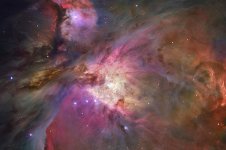The visible light that originally left a distant galaxy may have its wavelength increased by a factor of 10 as it travels through the expanding universe and we observe it, not as visible light, but as infra-red or microwave radiation.So how are we able to observe an object distancing itself at twice the speed of light?
The term 'redshift' is used to describe this increase in wavelength. I presume followers of this thread are familiar with the electromagnetic spectrum and how the properties of the radiations change as we move towards the longer wavelengths.
Attachments
As far as I can remember, the maximum relative velocity can never exceed the speed of light in vacuum. Consequently, an object cannot distance itself at more than the speed of light.So how are we able to observe an object distancing itself at twice the speed of light?
So how are we able to observe an object distancing itself at twice the speed of light?
It's space itself that is expanding FTL, and there is no relativistic limit on that.
More dark energy doubts.
Very Existence of Dark Energy Cast in Doubt After New High Precision Data
Here’s some info on the most distance galaxy
GN-z11 - Wikipedia
It LY age is circa 13 billion but it’s proper distance is 32 billion LY. The discrepancy is due to the expansion of the universe.
GN-z11 - Wikipedia
It LY age is circa 13 billion but it’s proper distance is 32 billion LY. The discrepancy is due to the expansion of the universe.
It's worth noting that expansion does not apply when objects in space are bound together by gravity.
For example, the Andromeda galaxy is bound to our Milky Way galaxy, and instead of expanding away from us, is actually moving towards us!
The two galaxies are expected to 'collide' in about 4.5 billion years time.
YouTube
For example, the Andromeda galaxy is bound to our Milky Way galaxy, and instead of expanding away from us, is actually moving towards us!
The two galaxies are expected to 'collide' in about 4.5 billion years time.
YouTube
To 'expand' on that: 🙂It's space itself that is expanding FTL, and there is no relativistic limit on that.
Special Relativity prohibits objects from moving faster than light in our local spacetime which may be regarded as flat and unchanging.
Far out in the universe spacetime is not flat and unchanging, but is curved and changing in time.
There we must invoke General Relativity which allows the separation between two distant objects to increase faster than the speed of light.
Okey. ..
From wiki:
There are three main causes of redshifts in astronomy and cosmology:
# Objects move apart (or closer together) in space. This is an example of the Doppler effect.
# Space itself is expanding, causing objects to become separated without changing their positions in space. This is known as cosmological redshift. All sufficiently distant light sources (generally more than a few million light-years away) show redshift corresponding to the rate of increase in their distance from Earth, known as Hubble's law.
# Gravitational redshift is a relativistic effect observed due to strong gravitational fields, which distort spacetime and exert a force on light and other particles.
From wiki:
There are three main causes of redshifts in astronomy and cosmology:
# Objects move apart (or closer together) in space. This is an example of the Doppler effect.
# Space itself is expanding, causing objects to become separated without changing their positions in space. This is known as cosmological redshift. All sufficiently distant light sources (generally more than a few million light-years away) show redshift corresponding to the rate of increase in their distance from Earth, known as Hubble's law.
# Gravitational redshift is a relativistic effect observed due to strong gravitational fields, which distort spacetime and exert a force on light and other particles.
@ TNT - That's a good summary. We shouldn't forget the gravitational redshift which can occur in the vicinity of a black hole.
To 'expand' further on the expansion of the universe, here's a cut and paste from a post I submitted in the 'black holes and white holes' thread:
"The expansion of the Universe has no an effect when a binding force - gravitational, electromagnetic or nuclear - is present to overcome it.
On the scale of planets, solar systems and galaxies, gravitational forces dominate e.g. the galaxies in our Local Group aren't expanding away from each other, but are being pulled together by gravity.
However, on a larger scale, there is competition between the Universe's expansion and the gravitational attraction of all the matter present within it.
It's only on the largest scales of all, where the binding forces are too weak to defeat the rate of expansion, that expansion dominates.
That is why we need to look to the most distant galaxies in order to observe and measure the rate of expansion of the Universe."
To 'expand' further on the expansion of the universe, here's a cut and paste from a post I submitted in the 'black holes and white holes' thread:
"The expansion of the Universe has no an effect when a binding force - gravitational, electromagnetic or nuclear - is present to overcome it.
On the scale of planets, solar systems and galaxies, gravitational forces dominate e.g. the galaxies in our Local Group aren't expanding away from each other, but are being pulled together by gravity.
However, on a larger scale, there is competition between the Universe's expansion and the gravitational attraction of all the matter present within it.
It's only on the largest scales of all, where the binding forces are too weak to defeat the rate of expansion, that expansion dominates.
That is why we need to look to the most distant galaxies in order to observe and measure the rate of expansion of the Universe."
So there is/must be, a center of the Universe? I take it the ground zero of the Big Bang from which everything is expanding? This point in space then must be stationary, no? Or there is just nothing there?
So there is/must be, a center of the Universe?
If there was a big bang, it happened "everywhere" in space, which is thought to have been extremely small
at that time. There's no center of the universe, all space looks the same as here, on a large scale. Think of
the analogy of dots on the surface of a balloon as it is blown up. They all recede from each other, no center.
There is currently disagreement whether space and time appeared at the big bang, or instead pre-existed
from an earlier contracting phase.
Quanta Magazine
Last edited:
There is no centre of the universe! The Big Bang should not be visualised as an ordinary explosion. It was an explosion of space, not an explosion in space. The universe is not expanding out from a centre into space. Rather, the whole universe is expanding and it is doing so equally at all places, as far as we can tell.
If the Big Bang were an ordinary explosion we would be able to look out and see the expanding edge of the explosion with empty space beyond. Instead, we see back towards the Big Bang itself and detect a faint background glow from the hot primordial gases of the early universe. This "cosmic microwave background radiation" is uniform in all directions. This tells us that it is not matter that is expanding outwards from a point, but rather it is space itself that expands evenly.
If the Big Bang were an ordinary explosion we would be able to look out and see the expanding edge of the explosion with empty space beyond. Instead, we see back towards the Big Bang itself and detect a faint background glow from the hot primordial gases of the early universe. This "cosmic microwave background radiation" is uniform in all directions. This tells us that it is not matter that is expanding outwards from a point, but rather it is space itself that expands evenly.
Okay, I may be a moron here but I can't describe how oxymoronic this seems. Please indulge me all. If everything is moving away from everything simultaneously, the geometry dictates there has to be a central point/singularity from which it all emanates. If the Big Bang happened everywhere simultaneously, any direction we look back at reveals it and if that's the case, it doesn't matter from where you look back. So if this is all true, the Big Bang happened right here at these coordinates of the Universe, right?
I don't think so
I don't think so
It is so. Remember the spotted balloon analogy, the surface of the balloon is analogous
to our three dimensional space. Space itself is expanding, not material within space.
to our three dimensional space. Space itself is expanding, not material within space.
Last edited:
Yes indeed, the big bang is but one hypothesis about how the universe came to be.There is currently disagreement whether space and time appeared at the big bang, or instead pre-existed from an earlier contracting phase.
It is currently the most widely accepted hypothesis, but it could be a lot of tosh! 🙂
What about the middle of the balloon?
It's an analogy between the surface (only) of the balloon, and our three dimensional space.
There is not an exact correspondence. To further the analogy, our space could be contained within
a 4 dimensional space (or higher order).
Last edited:
The centre of the balloon does not correspond to anything physical.What about the middle of the balloon?
It is important to appreciate that three-dimensional space is being compared with the two-dimensional surface of the balloon. The surface has no point that should be picked out as the centre. The centre of the balloon itself is not on the surface, and should not be thought of as the centre of the universe.
Last edited:
Yes indeed, the big bang is but one hypothesis about how the universe came to be.
It is currently the most widely accepted hypothesis, but it could be a lot of tosh! 🙂
Not to mention inflation, which is in real peril.
- Status
- Not open for further replies.
- Home
- Member Areas
- The Lounge
- What is the Universe expanding into..


